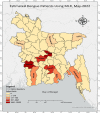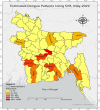Prediction of dengue incidents using hospitalized patients, metrological and socio-economic data in Bangladesh: A machine learning approach
- PMID: 35857776
- PMCID: PMC9299345
- DOI: 10.1371/journal.pone.0270933
Prediction of dengue incidents using hospitalized patients, metrological and socio-economic data in Bangladesh: A machine learning approach
Abstract
Dengue fever is a severe disease spread by Aedes mosquito-borne dengue viruses (DENVs) in tropical areas such as Bangladesh. Since its breakout in the 1960s, dengue fever has been endemic in Bangladesh, with the highest concentration of infections in the capital, Dhaka. This study aims to develop a machine learning model that can use relevant information about the factors that cause Dengue outbreaks within a geographic region. To predict dengue cases in 11 different districts of Bangladesh, we created a DengueBD dataset and employed two machine learning algorithms, Multiple Linear Regression (MLR) and Support Vector Regression (SVR). This research also explores the correlation among environmental factors like temperature, rainfall, and humidity with the rise and decline trend of Dengue cases in different cities of Bangladesh. The entire dataset was divided into an 80:20 ratio, with 80 percent used for training and 20% used for testing. The research findings imply that, for both the MLR with 67% accuracy along with Mean Absolute Error (MAE) of 4.57 and SVR models with 75% accuracy along with Mean Absolute Error (MAE) of 4.95, the number of dengue cases reduces throughout the winter season in the country and increases mainly during the rainy season in the next ten months, from August 2021 to May 2022. Importantly, Dhaka, Bangladesh's capital, will see the maximum number of dengue patients during this period. Overall, the results of this data-driven analysis show that machine learning algorithms have enormous potential for predicting dengue epidemics.
Conflict of interest statement
The authors have declared that no competing interests exist.
Figures







References
-
- Dengue and severe dengue. [cited 9 Nov 2021]. Available: https://www.who.int/news-room/fact-sheets/detail/dengue-and-severe-dengue
-
- Beltz LA. Chapter 2—Dengue Virus. In: Beltz LA, editor. Zika and Other Neglected and Emerging Flaviviruses. Elsevier; 2021. pp. 19–39. doi: 10.1016/B978-0-323-82501-6.00002–5 - DOI
MeSH terms
LinkOut - more resources
Full Text Sources
Medical

